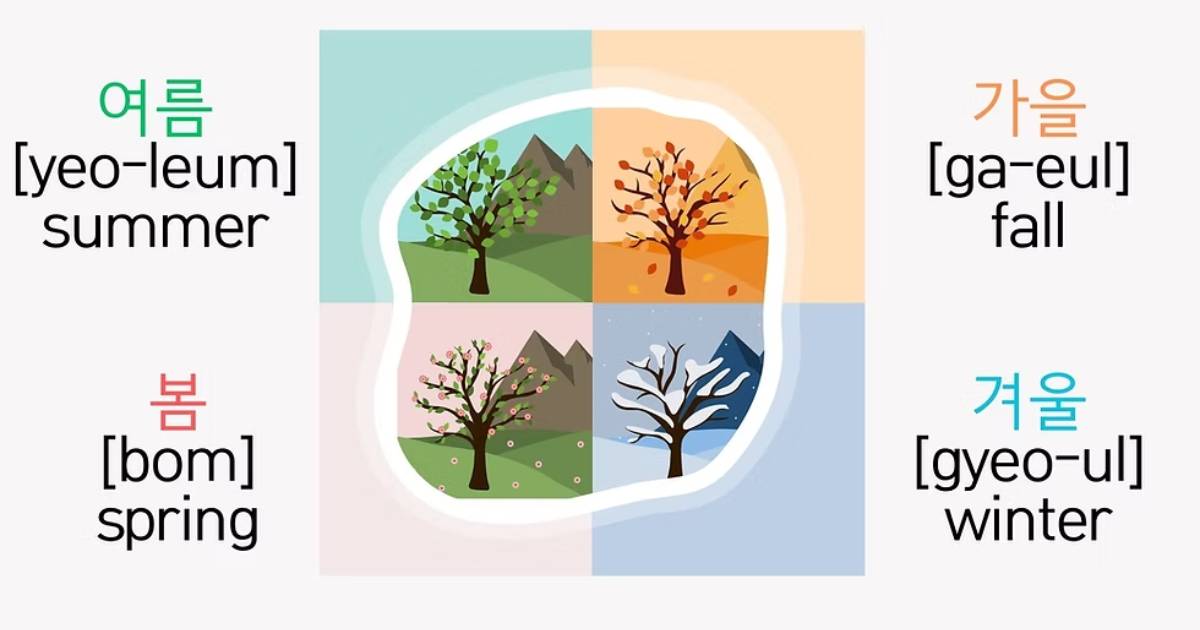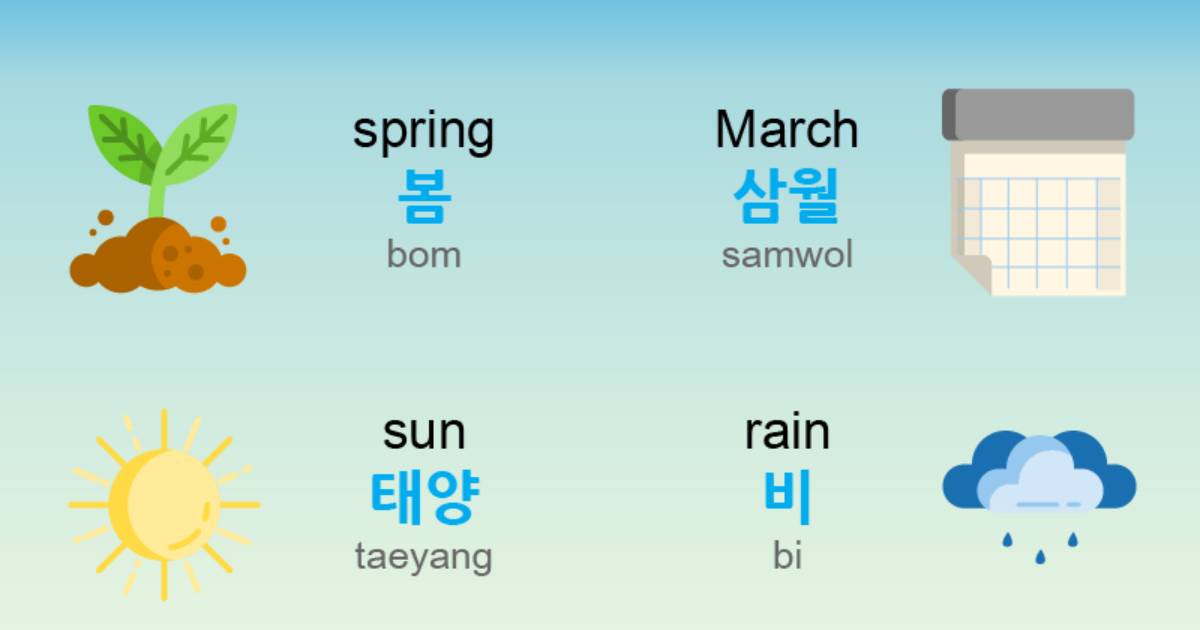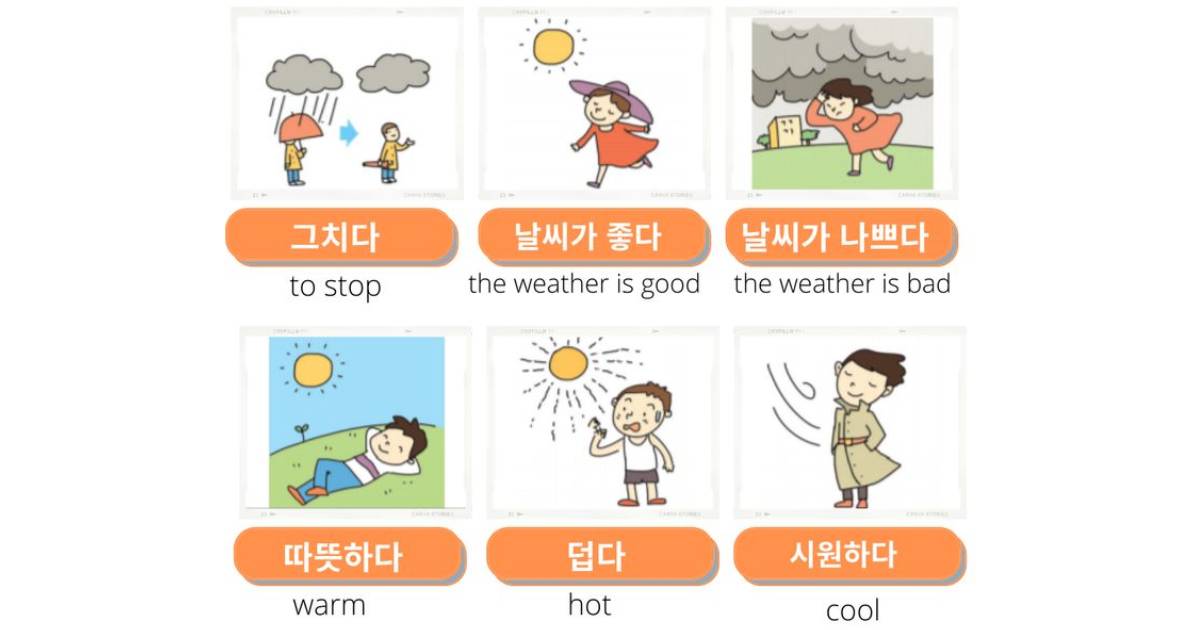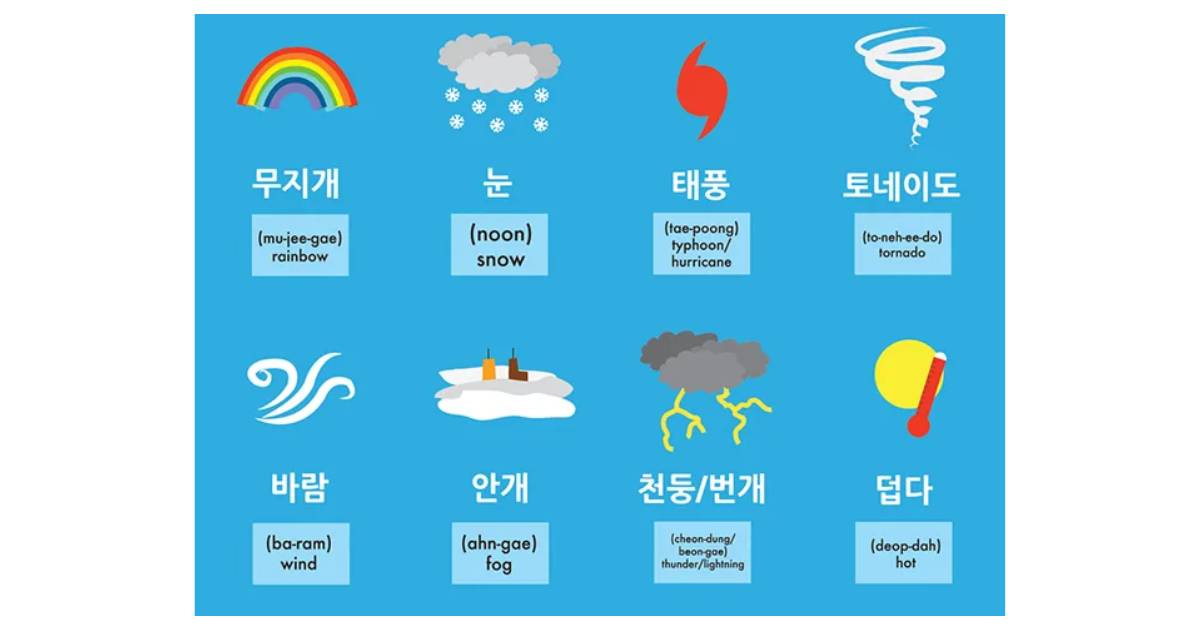I. 4 Seasons in Korea
Korea is renowned for its four distinct seasons, each bringing unique weather patterns and cultural experiences. Learning the seasons and weather in Korea is fundamental to understanding Korean culture, as seasonal changes deeply influence Korean lifestyle, food, and celebrations.
| Korean | Romanization | English Meaning |
| 봄 | bom | Spring |
| 여름 | yeoreum | Summer |
| 가을 | ga-eul | Autumn/Fall |
| 겨울 | gyeoul | Winter |
| 계절 | gyejeol | Season |
| 사계절 | sagyejeol | Four seasons |

II. Words to Describe Weather in Korea
Now that you understand the 4 seasons in korean, let’s dive into specific korean weather vocabulary that will help you describe any weather condition. These words are essential for daily conversations and will help you sound more fluent when discussing the weather in Korea.
1. Basic Weather Conditions
| Weather in Korea | Romanization | English Meaning |
| 날씨 | nalssi | Weather |
| 기온 | gion | Temperature |
| 맑다 | makda | Clear/Sunny |
| 흐리다 | heurida | Cloudy |
| 비 | bi | Rain |
| 눈 | nun | Snow |
| 바람 | baram | Wind |
| 안개 | an-gae | Fog |
| 구름 | gureum | Cloud |

2. Describing Specific Weather Conditions
| Weather in Korea | Romanization | English Meaning |
| 덥다 | deopda | Hot |
| 춥다 | chupda | Cold |
| 시원하다 | siwonhada | Cool/Refreshing |
| 따뜻하다 | ttatteuthada | Warm |
| 습하다 | seubhada | Humid |
| 건조하다 | geonjohada | Dry |
| 선선하다 | seonseonhada | Cool (pleasantly) |
| 쌀쌀하다 | ssalssalhada | Chilly |
| 후덥지근하다 | hudeopjigeunhada | Muggy/Sultry |

3. Weather Phenomena
| Weather in Korea | Romanization | English Meaning |
| 비가 오다 | bi-ga oda | To rain (lit. rain comes) |
| 눈이 오다 | nuni oda | To snow (lit. snow comes) |
| 천둥 | cheondung | Thunder |
| 번개 | beongae | Lightning |
| 태풍 | taepung | Typhoon |
| 소나기 | sonagi | Shower/Sudden rain |
| 이슬비 | iseulbi | Drizzle |
| 폭우 | pogwu | Heavy rain |
| 장마 | jangma | Monsoon season |
| 황사 | hwangsa | Yellow dust |
| 미세먼지 | misemeonji | Fine dust/Particulate matter |

Understanding these weather phenomena is crucial when discussing the weather in Korea, as yellow dust from China and fine dust are significant concerns, especially in spring and winter.
III. Common Korean Phrases About the Weather
Learning how to say weather in korea goes beyond vocabulary, you need to know practical phrases for real conversations. These expressions will help you discuss weather naturally with Korean speakers.
1. Asking about the weather
| Weather in Korea | Romanization | English Meaning |
| 날씨가 어때요? | Nalssi-ga eottaeyo? | How’s the weather? |
| 오늘 날씨가 좋네요 | Oneul nalssi-ga jonneyo | The weather is nice today |
| 내일 날씨가 어떨까요? | Naeil nalssi-ga eotteolkkayo? | How will the weather be tomorrow? |
| 비가 올까요? | Bi-ga olkkayo? | Will it rain? |
| 눈이 올까요? | Nuni olkkayo? | Will it snow? |
2. Describing current weather
| Weather in Korea | Romanization | English Meaning |
| 오늘 날씨가 정말 좋아요 | Oneul nalssi-ga jeongmal joayo | The weather is really nice today |
| 너무 더워요 | Neomu deowoyo | It’s too hot |
| 너무 추워요 | Neomu chuwoyo | It’s too cold |
| 비가 많이 와요 | Bi-ga mani wayo | It’s raining a lot |
| 날씨가 쌀쌀해요 | Nalssi-ga ssalssalhaeyo | The weather is chilly |
| 바람이 많이 불어요 | Baram-i mani bureoyo | It’s very windy |
| 습도가 높아요 | Seubdo-ga nopayo | The humidity is high |
Making weather-related suggestions:
- 우산 가져가세요 (Usan gajyeogaseyo) – Take an umbrella
- 따뜻하게 입으세요 (Ttatteuthage ibeuseyo) – Dress warmly
- 물 많이 마시세요 (Mul mani masiseyo) – Drink lots of water
These phrases are essential for anyone wanting to navigate conversations about the weather in Korea smoothly, whether you’re chatting with friends or making small talk with locals.
IV. Weather-related Korean Idioms and Expressions
To truly master vocabulary about weather in Korea, you should learn some idiomatic expressions that Koreans use in daily life. These idioms often use weather phenomena metaphorically, adding color and depth to your Korean language skills.
1. Common Weather Idioms
청천벽력 (cheongcheon-byeongnyeok)
- Literal meaning: “Thunder from a clear sky”
- English equivalent: “A bolt from the blue”
- Usage: Describes shocking, unexpected news
비 온 뒤에 땅이 굳는다 (bi on dwie ttang-i gutneunda)
- Literal meaning: “The ground hardens after rain”
- English equivalent: “What doesn’t kill you makes you stronger”
- Usage: Hardships make you stronger
하늘이 무너져도 솟아날 구멍이 있다 (haneuri muneojyeodo sosanaul gumeongi itda)
- Literal meaning: “Even if the sky collapses, there’s a hole to escape through”
- English equivalent: “Every cloud has a silver lining”
- Usage: There’s always hope
소 잃고 외양간 고친다 (so ilko oeyanggan gochinda)
- Literal meaning: “Fix the barn after losing the cow”
- English equivalent: “Closing the barn door after the horse has bolted”
- Usage: Taking action too late
구름 위를 걷는 기분 (gureum wireul geonneun gibun)
- Literal meaning: “The feeling of walking on clouds”
- Usage: Feeling extremely happy or euphoric
바람 앞의 등불 (baram apui deungbul)
- Literal meaning: “A candle before the wind”
- Usage: A precarious or vulnerable situation
2. Cultural Weather Expressions
Koreans also have unique expressions that reflect their relationship with weather and seasons:
- 삼한사온 (samhan-saon): Literally “three cold days, four warm days,” describing Korea’s winter weather pattern
- 꽃샘추위 (kkotsaem-chuwi): “Flower-envying cold,” referring to the late cold spell in early spring that seems to envy the blooming flowers
- 가을 하늘은 말갛다 (gaeul haneureun malgata): “The autumn sky is clear,” praising Korea’s beautiful fall weather
Conclusion
Mastering vocabulary about the weather in Korea opens doors to more meaningful conversations and deeper cultural understanding. For more Korean language learning resources and practical vocabulary guides, visit GuruLango where we help students master Korean through engaging, real-world content.